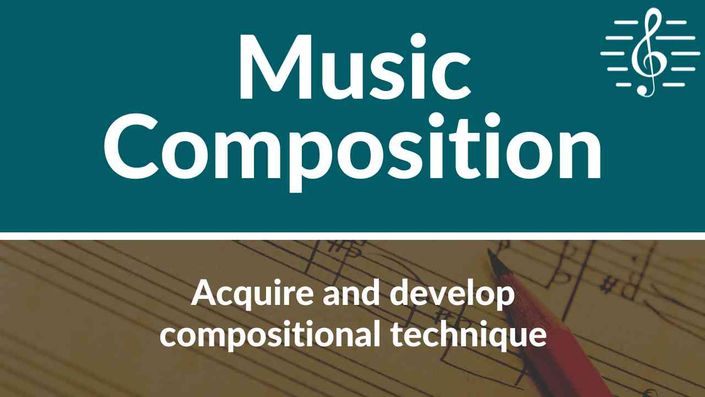
Music Composition
Gain a solid understanding of fundamental techniques and start composing better music.
Enroll in Course
What You Will Learn
Unleash your inner composer and develop your compositional technique with the Music Composition course.
Many people have great musical ideas but struggle to harness those ideas into effective compositions. This course shows you exactly how to do that. Starting with simple musical ideas this course will quickly move you towards more advanced writing. Areas covered include how to write good melodies, how to work effectively with chords, setting words to music, dealing with texture and structure, how to write a song, and a host of other issues. This comprehensive course will guide you through each area step by step, enabling you to develop your ability and potential as a composer. During the Composition course we'll cover...
- Foundations of Composition - How do you work out the chords in each key? What are the rules of theory you might want to keep in mind? How do cadences function and where might you use them?
- Melody Writing - What makes a really good melody? How do you write a melody that is well shaped and clearly structured? What are the techniques for creating a better melodies?
- Harmony and Chords - How do you inject colour and originality into your music? What would be a good balance of consonance and dissonance? Which chords can you choose to best fit your melody?
- Elaborating Ideas - How do you make a beautiful sound? How do you vary the organisation and approach to texture? What should you do to create a well-rounded structure to your composition?
- Word Setting - How do you put words to music? How do you translate words into different styles of song? How do you write a melody for a singer?
Thanks a ton! This is really very helpful. I love the way you explain with several examples!
- Mala

Who Is This Course For?
Aspiring composers eager to develop their skills.
We all want the creative process to flow, but sometimes our efforts don't translate all that smoothly and we find ourselves rather lost, hoping to chance upon something that works. One of the greatest things you can do to supercharge your composing, songwriting and arranging abilities is gain a greater facility and knowledge of technique. You know what you want to create, you know how to create it and you can execute it with ease. The Music Composition course is where you can achieve this. Learn the intricacies of chords, harmony, melody, rhythm, word setting, cadences, texture, structure and more. Plenty of compositional technique is covered in a very practical way throughout and it will transform the way you compose and will liberate you to develop your creative ideas.
Do any of these sound familiar?
"I’m good at coming up with ideas but struggle to turn them into complete compositions..." "I can compose a melody but I’m not great when it comes to chords..." "I can compose to an extent but my pieces tend to ramble or get stuck, and sometimes become too predictable…" "I can come up with lyrics but find it a struggle to fit them to melodies and/or rhythms that work well..." "I can string familiar chords together but really want to vary my harmony much more…"
↓
What a delightful and thoroughly enriching course. Thanks so much!
- Carl

By the end of the Music Composition course you'll be able to…

Compose strong melodies which are varied and interesting

Write songs and set words to effective rhythms

Colour your music with chromatic chords, and with dissonance and resolution

Explore varied textures within your composition

Express yourself and your musical ideas fluently with correct technique

Build structure within your composition allowing you to write easier
Marvelous exercises and a great course! Thanks so much. I feel incredibly fortunate to have found Music Matters. Your whiteboard and wisdom are the rudder to right my musical ship.
- Wolf

Course Information
What's Included with the Music Composition Course?
Professional Teaching
You'll receive expert tuition on a wide range of compositional techniques and how to apply them in your own writing.
Practical Exercises
Each video teaches you the method for effective composition and then follows it by relating it to inspiring example uses.
Ask Questions
Below each video you are able to post comments and ask questions should you have any in regards to the course topics covered.
Easy to Follow Structure
The course is divided into multiple stages, breaking down each part separately before putting it all together.
Complete at Your Own Pace
You can easily fit the course around your regular commitments, completing it at your own pace and in your own time.
Anywhere Access
Your course never expires. Learn when and where you choose! Computer or mobile. Just get comfortable and dive in!
↓
Your Instructor

Hi, I’m Gareth and I'm passionate about developing ‘the all round musician’.
Over 35 years of music examining with ABRSM, work with the BBC on Radio and TV, experience on the international concert platform, as a published composer and arranger, have brought rich resources to the 40 years of teaching in which I've engaged.
Scholarships at The Royal College of Music, Oxford University and St. Paul’s Cathedral gave me fantastic opportunities to learn from the best musicians, scholars and teachers. Working as Director of Music at Queen Elizabeth Grammar School then provided a wonderful opportunity to develop my teaching skills.
Teaching individuals and groups of all ages, and at all stages of development have refined a teaching approach that I hope is fun and engaging, and focused on explaining things clearly and logically. And that is what these courses are all about - understanding the basic principles with clarity, then going deeper, applying them to your musical life and liberating yourself as a musician.
It’s a rich and amazing journey, and I can’t wait for you to join me today!
Course Curriculum
-
StartLesson 1 - Dealing With Chords 1 (28:33)
-
StartLesson 2 - Dealing With Chords 2 (23:04)
-
StartLesson 3 - Cadences (17:09)
-
PreviewLesson 4 - Composing from a Chord Scheme (13:42)
-
StartLesson 5 - Composing from a Melody (36:13)
-
StartLesson 6 - Setting Words to a Rhythm (28:32)
-
StartLesson 7 - Diminished 7th Chords (21:24)
-
StartLesson 8 - Neapolitan 6th Chords (9:45)
-
StartLesson 9 - Augmented 6th Chords (22:49)
-
StartLesson 10 - Other Chromatic Chords (20:16)
-
StartLesson 11 - Dissonance & Suspensions (27:01)
-
StartLesson 12 - Writing Effective Harmony (53:26)
-
StartLesson 13 - Texture (16:01)
-
StartLesson 14 - Structure (36:49)
-
StartLesson 15 - Writing a Song (39:35)
Frequently Asked Questions
A Letter from Gareth Green
MA (Oxon), MA (Leeds), FRCO(CHM), FLCM, ARCM
I wonder if as a composer you ever have the feeling expressed by Gustav Mahler when he said:
"I am hitting my head against the walls, but the walls are giving way."
The process of composing sometimes flows freely, yet often it’s a frustrating struggle. Many composers are able to come up with creative ideas then hit those walls of which Mahler speaks. You’ve got a melody you’re pleased with but you can’t find the chords to go with it, or you’ve got a great chord scheme but can’t quite settle on a melody that sounds good. You’ve got a melody and chords but you’re not sure how to develop the ideas or to vary them. You’ve got some words but can’t comfortably fit them to a rhythm and metre that fits like a glove. You’ve composed a piece but the texture seems unvaried or the piece rambles because the structure is unclear. These, and others, are the frustrations with which composers have struggled over the centuries and are common to composers working right across the spectrum of musical styles.
Mahler’s comment implies that one fix is to keep composing. The more you write, the better you get, and those walls begin to give way. That’s true of any human endeavour. We are creatures of repetition - the more we repeat a process, the better we get at it. Yet, we also need technique and, over the course of a number of decades, composers have come my way desperately searching for the technique to turn their creative ideas into complete compositions that work. Brahms put his finger on the pulse when he said:
“Without craftsmanship, inspiration is a mere reed shaken in the wind."
This course is a distillation of decades of composing and teaching composition that offers you the essential techniques you need. It is designed to give you the craftsmanship of which Brahms speaks. Once you have the technique you will never look back. You will still sometimes hit some of Mahler’s walls but repetition of the process empowered by technique will transform your compositional achievements.
So if you would like to be equipped with the techniques you need to turn your creative ideas into successful compositions join me on this course and transform your skills.
— Gareth Green, Music Matters




